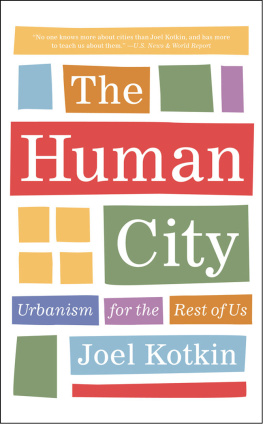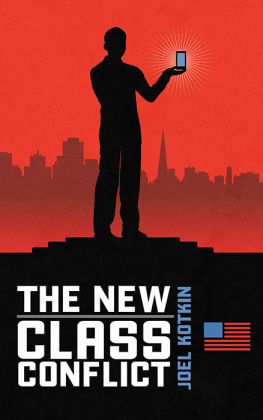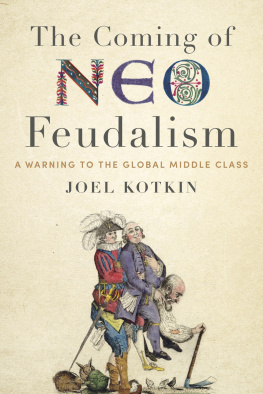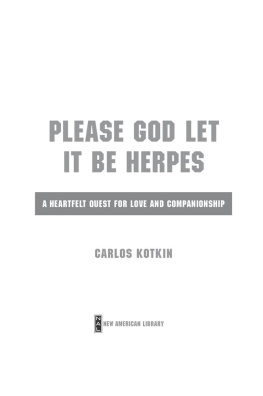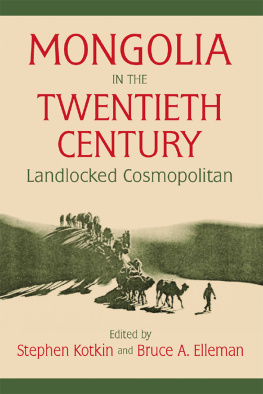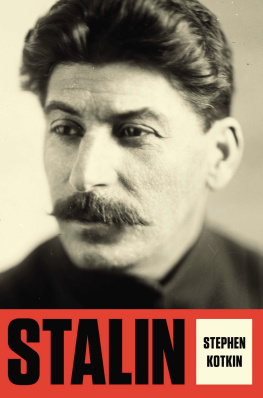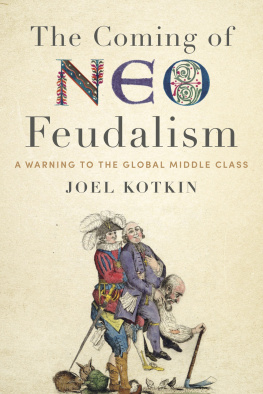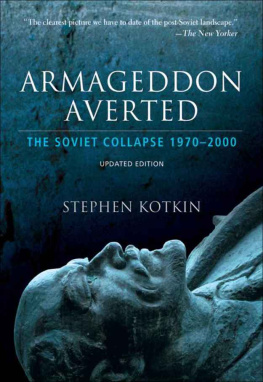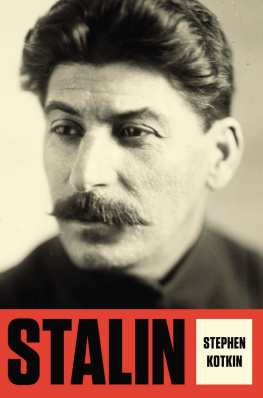Praise for Joel Kotkin and
The Next Hundred Million: America in 2050
Given the viral finger-pointing and hand-wringing over whats seen as Americas decline these days, Mr. Kotkins book provides a timely and welcome... antidote. New York Times
Kotkin... offers a well-researchedand very sunnyforecast for the American economy.... His confidence is well-supported and is a reassuring balm amid the political and economic turmoil of the moment. Publishers Weekly
A fascinating glimpse into a crystal ball, rich in implications that are alternately disturbing and exhilarating. Kirkus Reviews
Kotkin provides a well-argued, well-researched and refreshingly calm perspective. Globe and Mail
For Mr. Kotkin, population growth translates into economic vitalitythe capacity to create wealth, raise the standard of living and meet the burdens of future commitments. Thus a country with a youthful demographic, in relative terms, enjoys a big advantage over its global counterparts. Wall Street Journal
Lamenting its own decline has long been an American weakness.... Those given to such declinism may derive a little comfort from Joel Kotkins latest book. Economist
Kotkin has a striking ability to envision how global forces will shape daily family life, and his conclusions can be thought-provoking as well as counterintuitive. WBUR-FM, Bostons NPR news station
Praise for The New Class Conflict
Were progressives serious about what used to preoccupy Americas leftentrenched elites, crony capitalism and other impediments to upward mobilitythey would study The New Class Conflict, by Joel Kotkin. Washington Post
In having the courage to junk the old nostrums, [Kotkin] has taken an important step forward. Financial Times
Joel Kotkins important new book, The New Class Conflict, suggests that Americas real class problems are deeper, and more damaging, than election rhetoric. USA Today
Kotkin is to be commended for seeing past the daily bric--brac of American politics to perceive the newly emerging class divisions. Washington Free Beacon
[This book] paints a dire picture of the undeclared war on the middle class. New York Post
This original and provocative book should stimulate fresh thinkingand produce vigorous dissent. Foreign Affairs
A provocative and useful contribution to the literature on class. Reason
Kotkins willingness to look beyond conventional labels and challenge trendy theories has made him stand out. spiked
Praise for The City: A Global History
This fast read succeeds most with Kotkin as storyteller, flying through time and around the world to weave so many disparate histories into one urban tapestry. Planetizens Fifth Annual Top 10 Books List, 2006 Edition
No one knows more about cities than Joel Kotkin, and has more to teach us about them. In The City, Kotkin takes us on a brisk and invigorating tour of cities from the Babylon of ancient times to the burgeoning exurbs of today. It is impossible not to learn a lot from this book. U.S. News & World Report
[The City] offers fascinating insight into the ideologies that have created different city designs, and into the natural human desire to gather together to live and for commerce. Orange County Register
The book is taut, elegant, informative and lots of fun to read. When I got to the end, I wished it had been longer. Governing
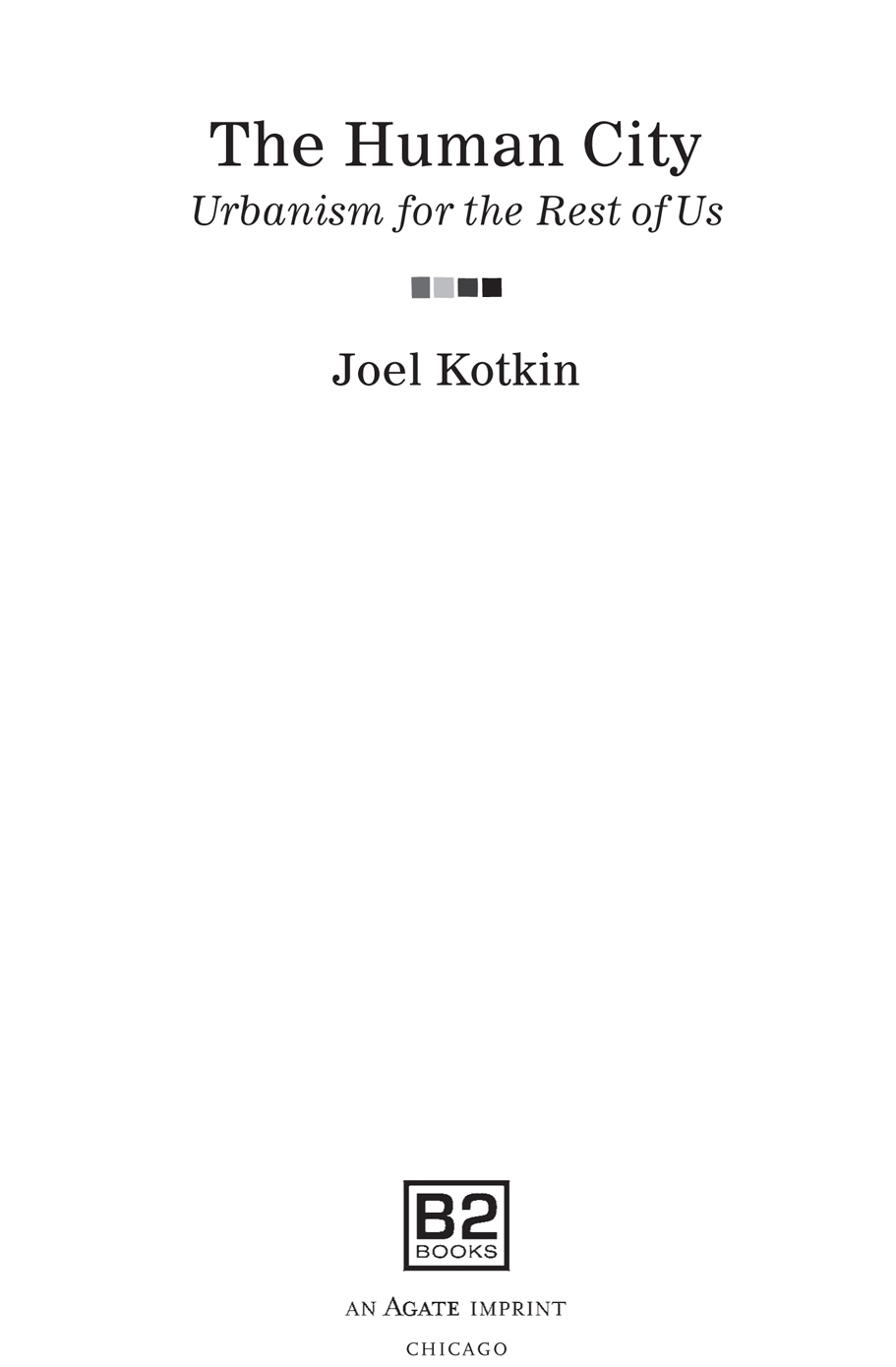
Copyright 2016 by Joel Kotkin
All rights reserved. No part of this book may be reproduced or transmitted in any form or by any means, electronic or mechanical, including photocopying, recording, or by any information storage and retrieval system, without express written permission from the publisher.
Library of Congress Cataloging-in-Publication Data
Names: Kotkin, Joel, author.
Title: The human city: urbanism for the rest of us / Joel Kotkin.
Description: Chicago: Agate B2, [2016]
Identifiers: LCCN 2015050503 | ISBN 9781572847767
Subjects: LCSH: Urbanization. | Sociology, Urban. | City planning. | Community development, Urban. | Urban policy. | BISAC: SOCIAL SCIENCE / Sociology / Urban. | SOCIAL SCIENCE / Human Geography. | POLITICAL SCIENCE /
Public Policy / City Planning & Urban Development. | ARCHITECTURE / Urban & Land Use Planning.
Classification: LCC HT361 .K686 2016 | DDC 307.76--dc23
LC record available at http://lccn.loc.gov/2015050503
10 9 8 7 6 5 4 3 2 1
16 17 18 19 20
B2 is an imprint of Agate Publishing. Agate books are available in bulk at discount prices.
agatepublishing.com
To Grammy and Mmwho came from the hard places of
Brooklyn and Parisand found the human city
CONTENTS


BOOKS HAVE MANY ORIGINS, and that is also the case with this one. I started thinking about a new approach to urbanism after being exposed to a series of viewslargely in favor of cramming people into ever-denser spacesthat now dominates most thinking about cities. I had also been exposed repeatedly to analyses, including some of my own, that rated cities largely from the perspective of their economic productivity.
Economic growth, of course, is critical to urban health and the lives of urban citizens. But how growth impacts daily life, I came to realize, is also important. If we build cities, as we increasingly do, in ways that accentuate divisions among the classes and decrease the quality of life for familieseven to the point of discouraging people from having childrenwhat have we accomplished? Even if skylines rise and architects create hitherto impossible-to-imagine structures, a city still primarily needs to be, as Descartes noted, an inventory of the possible for the vast majority of its citizens.
These thoughts came together for me when I was working in Singapore. Here was arguably the best-planned dense urban area in the world, a model of modernist design and post-industrial prosperity. Yet in doing scores of interviews and reviewing survey data, it became obvious to me that high-density living, coupled with enormous career pressures, was also producing high levels of anxiety and breaking down what had been an exceptionally strong familial culture.
I articulated these thoughts in a speech called What Is a City For? that I gave to the Singapore University of Technology and Design in the spring of 2013. It was published later that year by the Lee Kuan Yew Centre for Innovative Cities. In that address, I began to search out answers to that question. My thinking was further shaped by a suggestion from one of my colleagues, geographer Ali Modarres, to look at Aristotle, first and foremost, for some basic principles.
In the ensuing two years, the book began to take shape, although I knew much of it ran very much contrary to the prevailing wisdom about cities. Yet as I went through the historical literature and observed cities around the world, it became clear that there was an enormous gap between what planners, politicians, and much of the business community were advocating forever more densityand the everyday desires of most people, particularly working- and middle-class families. It seemed only proper that someone speak to these aspirations as well.
In no way do I consider this book, in its essentials, anti-urban. Instead, the task here is to
Next page
